- Home
- Chinua Achebe
Chike and the River Page 4
Chike and the River Read online
Page 4
15 Chike Is in Trouble
At last the ferryboat arrived in Asaba and the passengers rushed out. Chike looked around him. He could not believe his eyes. Was this Asaba about which he had heard so much? There was nothing to see except a few miserable-looking houses. He was really disappointed. He joined the other passengers and climbed the steep ascent to the market. Things brightened up there. But he had expected more. The market could not be compared to the one in Onitsha. There was nothing here like Bright Street where the noise of highlife records drowned the noise of cars. He walked beyond the market with his hands in his pockets, looking this way and that like a European inspector of schools.
From the stories his friends told Chike expected Asaba to be better than any place he had seen. And he expected the Midwestern region to be very different from the East. But now the air felt the same, the soil had the same look, and the people went about their business in the same manner. As Chike went farther inland he saw better houses. But still they were nothing to write home about; they were all inferior to the fine buildings on New Market Road at Onitsha.
Anyhow, Chike was happy about one thing. He could now talk like the rest of his companions.
Evening was setting in. Chike thought he had seen enough of Asaba and must now go back. He felt in his pocket for his sixpence and found it. He turned round and began to walk back to the riverside. The distance seemed to have increased. Chike began to run. But when he got to the bank the boat was gone. He could see it in the distance. It was already halfway to Onitsha. Chike was in a panic. He saw a marine official closing up his office. He ran to him and said with a shaking voice, “Please, sir, I want to return to Onitsha.”
“You want to return to Onitsha?” asked the man, searching his pocket for keys. He sounded helpful and kind. Chike’s hopes returned.
“Yes, sir,” he replied.
“I am sorry but you cannot return to Onitsha today,” said the man. “The last boat has gone. Come back tomorrow morning.”
“But I live in Onitsha,” cried Chike. “I know nobody here.”
“I am sorry,” said the man as he locked the door of his office and walked away.
Chike stood there weeping. Then one man who had been bathing in the river came up with a towel around his waist and said, “To come Asaba no hard but to return.” He looked very dangerous and wicked; Chike became really afraid and decided to go away from the riverside. With his head bowed and tears in his eyes he returned to the Asaba market. There he leaned against one of the old lorries and wept silently. He wished he had obeyed his mother and never gone near the river. Then he remembered another thing his mother always said. She told her children that crying does not solve any problem. So instead of crying Chike began to think and plan.
His first thought was to go to the owner of one of the shops and ask if he could sleep there. But then it occurred to him that the man might be a thief and kidnapper. Finally Chike decided to hide inside one of the old lorries until morning. He inspected them and saw that one was called S.M.O.G. no. 1. He decided to sleep in it because of its good and friendly name.
16 Chike’s Troubles Grow
Chike did not want to go into the lorry while people were looking. So he decided to walk around until it was quite dark. He saw traders closing their shops and market women packing up their wares to return home. Soon the market was almost empty. Dusk was followed by darkness. Chike went to the back of the lorry and climbed in quietly. At first he lay down on one of the benches. Then he thought it was better to hide under them. So he climbed under the benches and lay on the floor of the lorry. He thought of his mother and sisters quite safe at home and his misery grew. He was hungry and mosquitoes sang in his ear. He did not try to kill them because they were too many and because killing them would make a noise. He coiled himself up with one hand as pillow and the other between his knees. He could not sleep because of fear. Several times he thought he heard footsteps approaching. He prayed and cried quietly in the darkness.
After a long time he fell asleep. But it was not a restful sleep. He was troubled by bad dreams. He dreamt of all kinds of evil men and spirits chasing him and screaming in his ears.
Then in the middle of the night he woke up suddenly. Three men were talking very close to him. His body froze with fear. The men were actually leaning on the lorry. Chike could hear their bodies rubbing against the wood. They spoke in low voices, sometimes in Ibo and sometimes in pidgin English. Chike could hear every word they said.
“He is expecting us when the church bell rings three o’clock,” said one of them.
“Are you quite sure that he is trustworthy?” asked a second man.
“Yes,” said the first man. “I trust him.”
“You know that some of them can make arrangements with you and then go and tell the police,” said the second man again. “We must be quite sure that he is trustworthy.”
“Oga, if we no sure,” said a third voice in pidgin, “make we no go at all. I no de for police wahala.”
“You people too fear,” said the first man. “Small thing you begin de shake like woman. Na only when time come for chop money person go know say you get power.”
“Oga, no be say we de fear,” said the second man, “but Oyibo people say prevention is better than cure.”
“To get rich no easy; na for inside rock money build im house. If fight come we go fight. Dis revolver way I hol for hand no be for yeye?” said the man they called Oga.
Chike was now afraid even to breathe. He knew that if he made the slightest noise they would shoot him so he kept as quiet as a mouse.
As the men talked and made plans the church bell struck three. “Oya, make we go,” said the first man, “by God power everything go all right.”
Chike was happy when he heard “make we go.” But his happiness vanished when he heard someone climbing into the back of the lorry. He opened his mouth to scream but no sound came out. Sweat covered his body and his throat was dry. He shut his eyes tight and waited for the worst.
The engine of the lorry started and it began to move. Chike opened his eyes a little but it was too dark to see. He closed them again. His body was now trembling.
The strange man at the back of the lorry with him began to cough and mutter something to himself. Because of his terror Chike did not know how long they had been traveling. But he knew when the lorry slowed down. Then it took a turning and went very slowly for a while before it stopped finally.
17 What the Thieves Did
When the lorry stopped the man at the back climbed out. Chike opened his eyes but it was pitch dark. The three men were now talking in whispers. Then the driver reversed the lorry.
For a while there was silence. Chike prayed that the men would move away for even one minute so that he could get down and hide. But they did not move. Instead a fourth man came and joined them. From what they said Chike understood that this fourth person was the night-watchman.
The first man, who seemed to be the leader of the thieves, spoke to the night-watchman.
“You see this gun way I carry,” he said, “I no carry am for play. If you start any turn-turn game na we and you go die.”
“Why I go play you turn-turn game?” asked the watchman. “You tink money de bitter for my mout? Or you tink na dis watch-night work I go take send my pickin for college?”
“Oya, come show us the door,” said the leader. Then he told the driver, whose name was Ignatius, to move out the benches from the back of the lorry. Chike was half-dead. He heard the man let down the tail-gate. But he did not come in. Instead he returned to the front of the lorry to get a flashlight. In the twinkling of an eye Chike slipped out and began to walk away. He had no idea where he was going. It was too dark to see. But he continued walking as quietly as a cat. Unfortunately his foot kicked against a tin and made a noise.
The driver shouted, “Who dat?”
Chike turned sharply to his left and ran. His eyes were now used to the darkness and he could see vag
uely. He saw something like a door and walked in.
“I say who dat?” shouted the driver again and shined a flashlight.
There was very little room where Chike had entered. He felt about with his hands and found that the thing was like a big box with an open door. He wanted to get out again and run. But the other men had joined the driver. He was telling them that while he was looking for his flashlight he heard a man’s footsteps.
Chike shut his eyes and bit his lips. The men were looking for him. The night-watchman told them that no man would be walking around there at that hour. He said perhaps it was the cat which lived in one of the old houses. This reassured them and they all went away again. Chike’s heart continued to pound like a pestle in a mortar.
Later he heard the men loading things into the lorry. It took them a very long time. But in the end the engine started and the lorry moved away. Chike heaved a great sigh of relief. He felt like singing. Then he remembered the night-watchman; he must be somewhere quite near. Chike’s happiness vanished again. He prayed to God to send daylight and save him. As if in answer to his prayer a cock crowed somewhere in the distance. Another answered from the opposite direction.
But Chike did not know when dawn came. He was so tired that he had fallen asleep, standing.
18 How It All Ended
For the second time Chike was awakened by the voices of people. He opened his eyes in terror. To his great joy it was daylight. He came out of the huge box and peeped in the direction of the voices. They were loud and friendly. So he went toward the crowd. He was amazed by what he saw. A man was tied to a mango tree. His hands were tied behind him and his mouth was covered with a black cloth. He could neither move nor speak.
The crowd was very excited. Someone tried to untie the man but the others said it was best to wait for the police. Chike was thinking very hard. But he could not understand what was happening. His mind was confused and tired.
At last two policemen arrived and the man was untied. He fell down to the ground and Chike thought he was dead. Someone brought cold water and they poured it on him. This seemed to help because he raised himself and sat down.
It took him a long time to recover fully and to tell his story. All the time Chike was thinking as hard as he could. Everybody waited to hear the story of the man who had just been untied.
When he had rested he drank some water. Then he told his story. He said he was watching the big shop when a band of armed robbers attacked him and overpowered him. They tied him to the tree and then broke into the shop. He said they were about eight in number and that they came in a new lorry.
The policemen were about to go and look at the shop when a small boy suddenly shouted from the crowd.
“The man is telling lies,” cried the boy. “I saw them.”
All eyes were turned on the small boy. It was Chike.
“What is he talking about?” asked some people.
“I saw the thieves,” said Chike. “This man helped them. I heard him talking with them.”
Perhaps some people would have ignored Chike if the watchman had not then behaved violently. As soon as he heard what Chike said he rushed forward and seized him by the throat. But one of the policemen saved Chike and pushed the man aside. The crowd was now angry with him for his violence.
“Do you want to kill the boy?” asked some of them. “It seems the boy has spoken the truth,” said the others.
The policemen asked Chike what he meant. He was so excited that he could not tell the story well. But he told enough to convince everyone that he spoke the truth. He told them that the lorry was called S.M.O.G. no. 1 and that its driver was called Ignatius. Then he showed them where he had hidden after his escape from the lorry. It was a sentry-box in a nearby garage.
As Chike told his story the night-watchman began to shake. He covered his face with his hands to hide his tears.
Chike became a hero. One big man in the crowd lifted him up and placed him on his shoulders. The others applauded. They said they had never seen such bravery from such a little boy.
The police arrested the three thieves that same day. They also recovered the bales of velvet they had stolen. The cloth was worth thousands of pounds. The manager of the shop shook hands with Chike and promised to make him a present later. Then he gave him a good meal and drove him in his car to the ferry.
Everywhere people spoke of Chike’s adventure. His photograph appeared in the local newspaper and his name was mentioned on the radio. Then, after the three thieves and the night-watchman had been tried and imprisoned, Chike got a letter from the manager of the shop. He announced that the company which owned the shop had decided to award a scholarship to Chike which would take him right through secondary school.
So Chike’s adventure on the River Niger brought him close to danger and then rewarded him with good fortune. It also exposed Mr. Peter Nwaba, the rich but miserly trader. For it was he who had led the other thieves.
Chinua Achebe
***
[1] A lorry is a truck.
(<< back)
[2] Soccer.
(<< back)
[3] Hammock.
(<< back)
FB2 document info
Document ID: fbd-608327-b63a-a544-f288-0d6f-274c-f5f81d
Document version: 1
Document creation date: 27.09.2011
Created using: Fiction Book Designer software
Document authors :
Source URLs :
About
This file was generated by Lord KiRon's FB2EPUB converter version 1.1.5.0.
(This book might contain copyrighted material, author of the converter bears no responsibility for it's usage)
Этот файл создан при помощи конвертера FB2EPUB версии 1.1.5.0 написанного Lord KiRon.
(Эта книга может содержать материал который защищен авторским правом, автор конвертера не несет ответственности за его использование)
http://www.fb2epub.net
https://code.google.com/p/fb2epub/

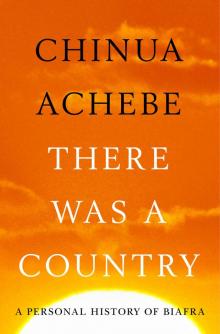 There Was a Country: A Memoir
There Was a Country: A Memoir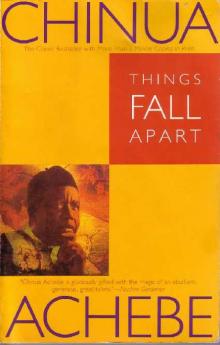 Things Fall Apart
Things Fall Apart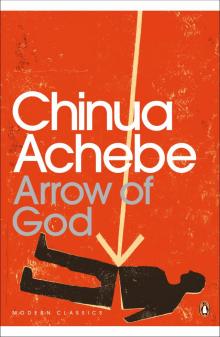 Arrow of God
Arrow of God Hopes and Impediments: Selected Essays 1965-87
Hopes and Impediments: Selected Essays 1965-87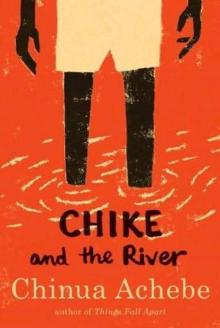 Chike and the River
Chike and the River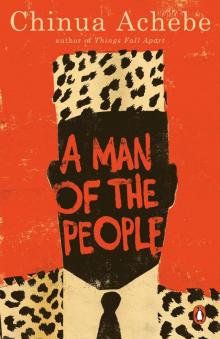 A Man of the People
A Man of the People Chinua Achebe: Collected Poems
Chinua Achebe: Collected Poems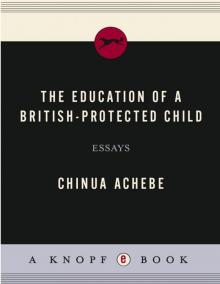 The Education of a British-Protected Child: Essays
The Education of a British-Protected Child: Essays No Longer at Ease
No Longer at Ease Girls at War
Girls at War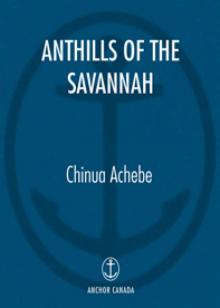 Anthills of the Savannah
Anthills of the Savannah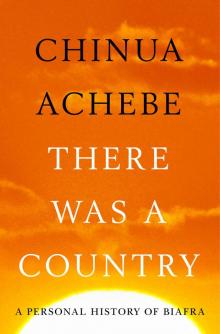 There Was a Country: A Personal History of Biafra
There Was a Country: A Personal History of Biafra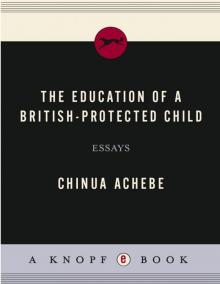 The Education of a British-Protected Child
The Education of a British-Protected Child Collected Poems
Collected Poems